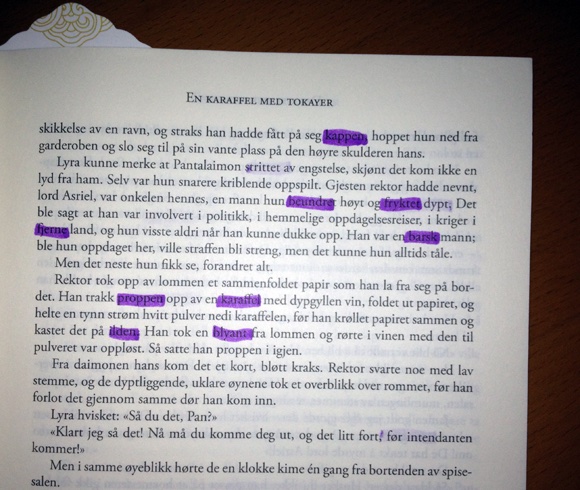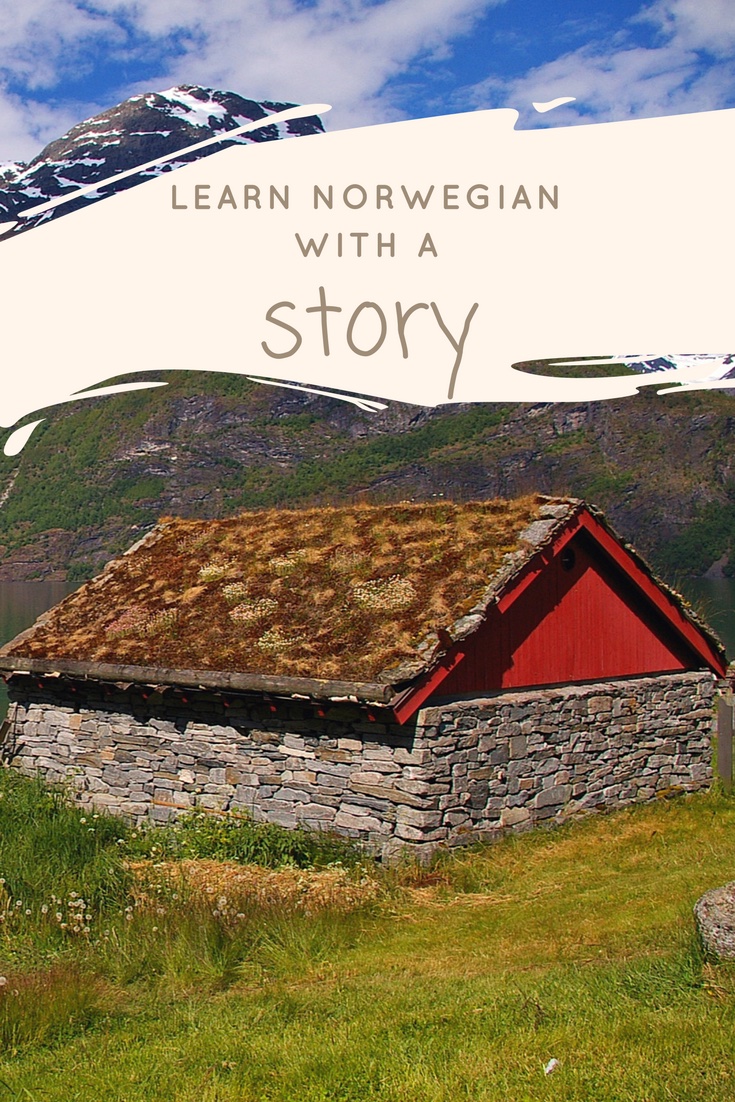
Once you've learned the basics of any language, its the expressions and idioms that add colour.
This is part of a series on how to learn Norwegian.
When I started learning Norwegian I tried to translate every world in order to get the meaning of a sentence. Most of the cases it did work, but others, it does not. Here is my list of some common Norwegian phrases that you will hear while in Norway and which directly translate in a funny way.
Learn Norwegian Now: Norwegian Class 101 / The Mystery of Nils
Takk for sist – “Thank you for the last time”
The first time I heard this expression I thought my memory was failing and that I just had forgotten that I had recently seen this person.
What it really means: “Nice to see you again”
It is used when you meet someone that you see again but it does not matter how long ago you did.

Håper at det smaker – “I hope that it tastes”
This is an expression used when you are served or serving some food. My immediate reaction was to hope the same. After all it is food and it should have a taste, right?
What it really means: “I hope that you enjoy it”
This is a polite, nice way to serve food to guests.
—
Du har fått en telefon – “You've got a telephone”
I thought someone had bought a new phone the first time I heard about it.
What it really means: “You have a phone call”
You just have to stop thinking in how it translates to English and you will get used to this one.
—
Hva er i veien? – “What's in the way?”
This is something you neither hear while driving nor walking, though you could easily think that is what it means.
What it really means: “What's wrong?”
This is their way of asking you if there is some problem or something bothering you. Another expression worth remembering!

Å være midt i smørøyet – “To be in the middle of the butter's eye”
At first I just didn't know what to think or how to translate this expression. Some expressions make no sense at all, unless you really know the meaning.
What it really means: “To be right in the best possible spot”
So actually, if you hear this expression it is something very positive and not related to food!
—
To sum it up, any time you hear an expression and find it utterly funny or just plain weird, the odds are that it has a very different meaning than you first think.
When in doubt, simply ask for an explanation. Most of the time, the best thing to do is memorise these expressions as you will hear them often in Norwegian conversations.
—
Photo credit: CollegeDegrees360


“Å være midt i smørøyet”
Actually, it _is_ Food related. For this experiment, you will need a Skillet, some Butter, and an Egg.
Heat the Skillet up, and put a pat of Butter in the center. As the Butter melts, it spreads out. At some point, the moisture has been driven from the center, and the Butter there is clear, but the outer edges are still popping and yellowish. A Butter Eye with a yellow Iris.
Crack an Egg into the center of the Eye. The Butter there being mostly hotter oil at this point, the center of the Egg heats up quickly. The Egg Whites at the watery fringes cook slower, and take up the remaining moisture in the form of enclosed bubbles.
As the fringes brown, flip once for a few seconds to set the Whites just over the Yolk, and serve, with Salt and Pepper, and a side of Rashers. And Toast with Butter. And Marmalade. And Tea. And Kippers, if you like Kippers.
(Note that the Skillet used for frying Eggs shouldn’t be used for any other purposes, especially anything having to do with Kippers.)
“To be in the middle of the butter’s eye” here is in reference as to how you properly lay your Egg.
(I do hope that you will be nice, and not Spam my email address.)
Actually, a “butter eye” in Norwegian refers to the butter in the middle of your porridge. And everyone knows that the bit of the porridge with the butter is the best bit.
Such interesting information, but you had me at “butter.”
Wrong, it`s not eggs, it`s porrage. I`ve done and heard this since I was old enough to ski. One bowl of porridge, in the middle of it you make a hole and fill it with butter. The middle of the butter eye, the sweetest place in the porridge. the best place.
My uncle used to say something that sounded like “snakker bout a tulebooken” that I wish I could know exactly what it meant. Something about you’re talking nonsense.
Snakker om en tullebukk!
perhaps?
its fairly hard to translate yes.
Literally directly translated it says : talk about a rapscallion!
Tullebukk is both a positive and a negative word, depending on how it is said.
It means prankster, but can also mean something close to jerk.
I think rapscallion might be the word that comes closest – but not ? sure 😉
Examples:
((Din tullebukk))
((You tullebukk))
Parents often fondly call their children this when they are playing tricks on their family or just being children in general I suppose –
Sometimes when it’s not warranted to use strong language to correct behaviour tullebukk can be used as replacement.
However the same words can also be used a pretty negative way.
I once held up a subway train for someone running to reach it.
Then the conductor shouted out harshly : Dont block the doors you tullebukk !
So, what does hufda! actually mean? I hope it’s not obscene because it is sooooo fun to use!
If you mean “uff da” it’s an extremely old fashioned exclamation, not really a word, that you use when you’re surprised. To be honest, I only ever hear it being used by Americans on Facebook, and I think I’ve only heard it twice “in real life” in my six years in Norway…
You actually hear uff da in Norway a lot. Especially in Oslo and a town I’m from called Gjøvik. I’ve actually never heard an American use it. But it is very common in Norway
I was raised on a farm in Minnesota; both my grandmothers were born in Norway. There were (all together) 41 grandchildren (which means I have 40 first cousins) and we heard “uff da” quite a bit. It was generally uttered when a substantial task was at hand, but not in a feeling of disgust, just acknowledging the size of the task. Much like we would say, Oh my! Oh goodness! Good grief! Good heavens! Heavenly days!
Such as, the need to peel 20 pounds of potatoes. Or having to pluck 6 chickens before cooling, butchering, and frying them for a church picnic. Or having 3 of the dogs get into a skunk and needing tomato baths at the same time. Or, if 4 of the toddlers got into a jar of blackberry jam and “shared with each other.”
Those are all “uff da” moments for the poor beleaguered grandmas (and their daughters); the men were never roped into such activities (not in those days) they were either in the barn or in the fields.
That is the way my grandmother always used Uff da too.
I heard “Uffa meg” among friends & family in the Toten area of Norway
Meaning something like Oh dear – when something is nok OK
well being Norwegian and reading most of these are kind of getting my brain to think though all the stuff I’ve said during my 14 years of living, and ‘tullebukk’, is like a word for a nonsense goat , like jumping around being crazy pulling many pranks(like mention before),or sometimes its just meant to tell someone they are a funny idiot, ‘Tullebukk’ is usually used for kids, this word isn’t used too much anymore as of most children are only sitting inside playing video games(been there, done that.. still do, but i do also see the real world) and also i still don’t ever recall hearing ‘Å være midt i smørøyet’ can someone please tell me the actual meaning of this word??
Thank you.
(i have a mental problem of just saying thank you whenever i type, write or talk to multiple people at once, which is really annoying(please tell me im not the only one..(u also have a problem of putting many brackets in on the same message))) (so it usually looks very bad. like seen.)
Thank you, again.(im sorry if i have offended anyone in this message, if so, feel free to send an email, or reply. Thx)
My grandma was 2nd generation in the U.S. Both of her parents immigrated from Norway in the late 1800s. I remember her using “Uff da” as an exclamation.
There are some other words she used that I haven’t been able to find anything on. These are the phonetic spellings.
“Feasyfly” which I think was for passing gas.
“Feeda!” was used for something gross.
Apparently Lutefisk was feeda.
Does anyone recognize these words?
Feeda = Fyda! or Fy da! Used to express disgust,
loathing, contempt or annoyance.”Fy” is an old word and it’s origins are actually derived from the sound of spitting. Ptui!
Feasyfly = Fise. To pass gas.
Hope it helps 🙂
Well, I do recognize that Lutefisk is gross. 😉 As native born Norwegians (from Oslo and Moss), no one in my family cares for lutefisk, ranging from simply not caring for it to an active loathing.
To use computer programs (such as Google Translate) to translate, can often produce questionable results. Many times modern programs don’t know the meaning of words from a hundred years ago. While translating some text from a bygdbok, the bygdboker used the term “gan”, in quotes, in this sentence: “Baade han og hans hustru skulde være noen trold og slemme til aa drive med “gan”. ”
I can find no definition for the word “gan”. The translation program (Google Translate) translates the sentence this way: “Both he and his wife were to be some trolls and bad guys to drive the “gan”.”
What do you think that sentence says in understandable English? (I don’t think the bygdboker is referring to the couple as a ‘Bonnie & Clyde’. Or is it?)
Thank you!
This is spelled in Danish, Norwegian writing before 1900. I think the word is actually ugagn misspelled, meaning “to do mischief” .
Gann – or Ganne has in old lap traditions to cast a bad spell on someone – use magic in a bad way. Mostly used in northern Norway – bnaturally since that is where most laps lived. The shamans – or seidmenn – could do that, but others too.
It could also be a small mispronounciation of gagn – to do something useful – like gain. yWith an u infront, it becomes mischieves – ugagn.
Amusing piece! About “takk for sist”: I’d say it’s usually used when you have seen the person pretty recently, especially at a party or some other social gathering. If it’s been quite some time, you’re more likely to say: “Lenge siden sist!” (long time since I last saw you!)
Now here’s one that must have had quite a few foreigners puzzled: “Ha det!” Meaning: “Have it!”.
It comes from “Ha det bra.” Meaning “Be well.”
My relatives often said “uff da fee da” and I understood to to be “Oops, that’s gross”. For the same situation, a lot of Americans would now say “damn it, anyway”
Actually my mother who’s from Oslo uses “uff da”. She means “that’s a shame or oh poor you” that sort of thing. Maybe it’s a generational thing as she’s in her 70s.
have been living with Norwegian as a second household language for a while, and love some expressions like: Herlig Fred (my husband is from Kristiansand, so some heavenly stuff is common), Tråkket I salaten, Jeg giv meg over and men men er ikke bare bare.
uf da! used a lot in Trondheim area.Another exclamation is Du verden meaning you world., probably best translation is”you dont say”or bloody hell.
My Norwegian relatives used Uff Ds for a wide variety of things. IF something was hard to lift, going to be hard to do, unexpected happenings, like an egg falling on the floor, if you were watching something happening, like a hard tackle in football, results of a car crash. In later years, I noticed that the expression Oy Vey from another ethnic group often was used in some of the same situations. Not all, but many of the same.. and Uff Da Fee Da clearly for something distasteful or mildly distasteful. My father often used another another expression, but I have since learned from Norwegian television at least one meaning. I now know why he never translated it for us. One translation is frequently used in American B movies usually involving gangs.
My Norwegian father frequently said ‘uff a(v) meg!’ He was from Oslo. It means ‘oh dear me!’ or similar.
Growing up in a small Wisconsin town that was full of Norwegians we heard, Uff da, fy da, and isj da all the time! Uffda is used in good or not so good circumstances. Fy da and isj da were always in the no so good realm! On the
Team-Uff-da-USA Facebook page we have a lot of fun when it comes to discussing the sayings and ways of the old-timers. And if you don’t have sugar lumps at coffee time it’ll be a BIG uffda! Ha!
Uff da = Ouch, oh no, oh dear.
Usually when something happens, a small accident, or someone falling down or hurting themselves, or if a story about someone falling down and hurting themselves or had a negative experienced was heard.
Fy da = Similar to Uff da, but it has a stronger context. It is used when something caused disgust, or if someone did something bad (usually a kid), or if a story was heard, in which something really unfair happened to someone. “Fy” is normally used for something that qualifies for punishment or disgust, it can be yourself, a child, or someone who caused an unfavorable outcome to someone else.
Isj da = “ugh…..bleh” or “Yuck” type of expression, it is in the similar realm, but it would normally refer to something dirty, because “isj” basically means “Yuck”.
However, you can use it in a mild context with a child, for example if they got very dirty from playing etc. You would follow up with “probably need to clean yourself, change clothes and/or stop doing that”.
“Isj” can sometimes be used by younger people, but then used more in the context of “No way”, or simply out of disgust, as teens often reject most things. 🙂
My father was from Norway and he used to call my people something like Fjomp when he was mad at them. I can’t find it in any Norwegian/English translator. He also used a term of endearment to his female children that sounded something like Tompa. I would assume that these words would be old fashioned slang. He was from a little north of Oslo and he was born in the earlier part of the 20th century.
Fjomp means something similar to Tullebukk.
🙂
Basically it is a soft way of calling sometime silly if they do silly stuff. You can use it in a derogatory way, by using the same expression when talking about someone over 50+ too.
Tompa, possibly “Stompen/Stumpen”, meaning butt (literally), it is not very commonly used, but I have yeard some people refer to their children as “lille stumpen min”, meaning “my tiny butt”.
Some women use it to make a funny flirt with their man (normally not used the other way around, it will not fit well on grown women for some reason)
My Norwegian mom always used uffda, ishda and tullabuke.
What happens over there in the Norwegian belt to make people complain all the time? 😀
tullabuke = tullebukk
Means silly goat/stupid goat (literal translation).
Basically a person who is either full of cr*ap and talking about things they know nothing about, or someone who is incessantly horsing around. (can be a kid or a grown up, but it is usually soft on children while pretty derogatory when used about grown ups).